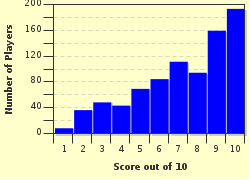
Spanish Relations Trivia Quiz
As a social worker carrying a caseload near the Mexican border, I learned the vocabulary of interpersonal and interfamilial relations. Do you know these family relations in Spanish? If you're fluent, you may get a chuckle from some of the choices.
A multiple-choice quiz
by Marshame.
Estimated time: 3 mins.
- Home
- »
- Quizzes
- »
- World Trivia
- »
- Spanish
- »
- Difficult Spanish
